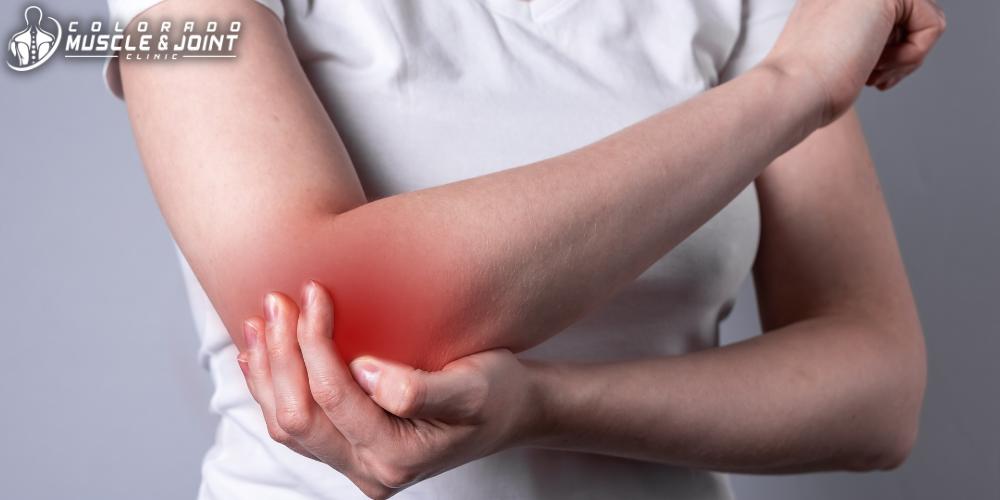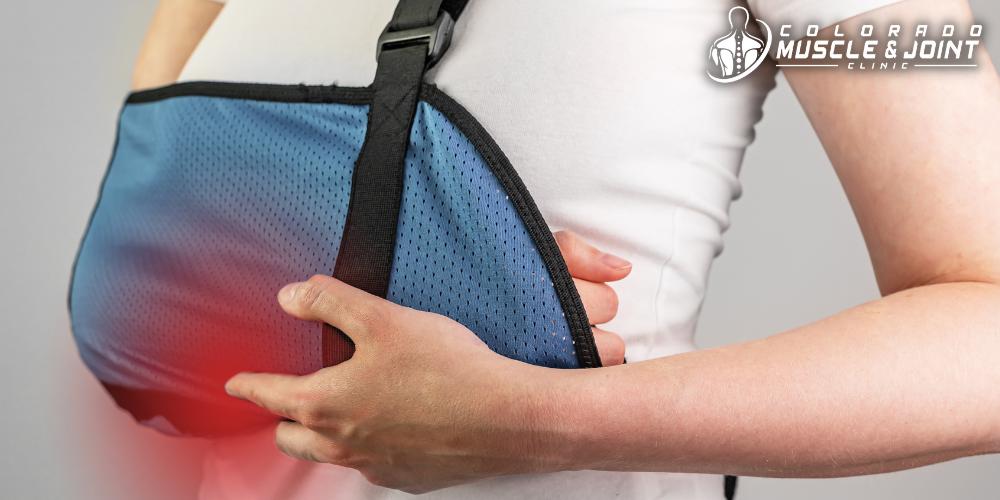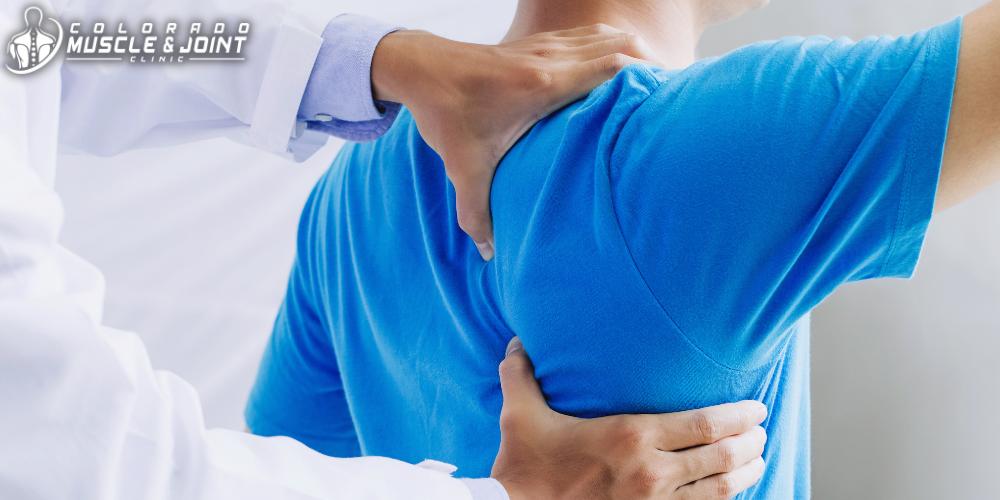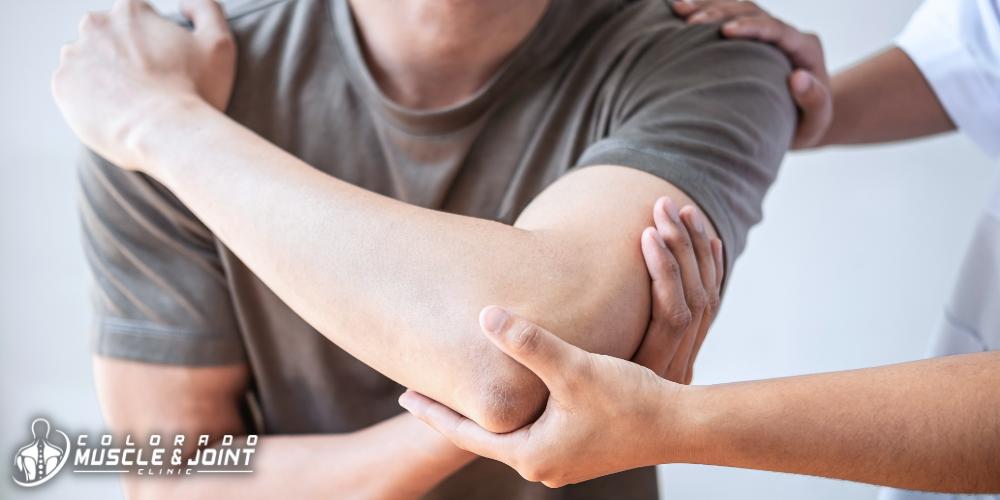Arm Pain
Chiropractic Care for Arm Pain
Moderate to severe pain in the arm is very common, and can greatly impact your everyday life. The exact cause of arm pain depends on the location, characteristics, and severity of the pain. It could indicate anything from a minor injury to a heart attack. Below, we discuss the most common causes of arm pain, and whether or not chiropractic care can help you find relief.

If you’re suffering from neck pain, back pain, headaches, sciatica, arm pain, or even leg pain, Dr. Huebner at the Colorado Muscle & Joint Clinic may be able to help. Call 970-744-6499 to book an appointment at our Loveland, CO clinic today.
What Arm Pain Can Feel Like
There are countless variations of arm pain that can all mean different things. Arm pain can coexist with shoulder pain, elbow pain, hand pain, or even chest pain. There are also many types of pain in the arm that someone can experience. Some people describe their arm pain as sharp pain, stabbing pain, tingling pain, burning pain, or just a deep ache. Other symptoms that can accompany pain in the arm can include poor range of motion, muscle weakness, numbness, swelling, bruising, or even a visible deformity.
What is the Most Common Cause of Arm Pain?
The most common cause of arm pain is general wear and tear from repetitive motions or an injury. General wear and tear or injuries can affect any part of the arm: the shoulder socket, the elbow, the wrist, the muscles, the bones, the tendons – you name it.
Common Causes of Arm Pain
The specifics of arm pain will vary significantly depending on the underlying cause. Below, we discuss some of the most common causes of arm pain so that hopefully you can determine whether a doctor’s visit is necessary.
Cardiovascular Issues
Pain in the arm can indicate cardiovascular issues, such as heart disease or a heart attack. More specifically, left arm pain accompanied by the following symptoms can indicate a heart attack:
- Chest pain or pressure
- Shortness of breath
- Intense fatigue
- Excessive sweating
- Fainting and/or light-headedness
- Nausea and/or vomiting
- Back or jaw pain
A heart attack is considered a medical emergency because it is life-threatening. This condition occurs when a blood clot prevents the heart muscle from receiving enough blood and oxygen. But why does a heart attack cause left arm pain for some people? It’s because the nerves that branch out from the heart and the nerves that branch out from the left arm connect to the same part of the spinal cord, and therefore, send signals to the same brain cells. So the body essentially cannot differentiate if the problem is coming from the heart or the arm.
Herniated Discs and Pinched Nerves
Another common cause of pain in the arm is a herniated disc or a pinched nerve. In between each vertebra, there are squishy pads (called discs) that absorb the shock of your daily movements. Disc herniation occurs when the contents of the disc bulge out into the spinal canal, often due to an injury or general wear and tear. Oftentimes, herniated discs compress nearby spinal nerves, which can lead to tingling pain and numbness in the limbs.
If you have one or more herniated discs in your cervical spine (your neck), you will likely feel numbness or tingling in your left or right arm. That’s because your cervical nerves branch out to the shoulders, arms, hands, and fingers, and allow you to move and feel pain.
Brachial Plexus Nerve Issues
There are two main types of brachial plexus nerve issues you can suffer from: brachial neuritis and a brachial plexus injury.
Brachial neuritis is similar to pinched nerves in that the sufferer may experience the same type of pain in the shoulder, arm, or hand. They may experience tingling, burning, or even numbness. But these conditions are entirely different.
Brachial neuritis is a form of peripheral neuropathy, which is a disease caused by non-functional or painful nerves. In this case, the brachial plexus nerve is the affected nerve. The brachial plexus nerve provides motor and sensory functions to the shoulders, arms, and hands. Most commonly, brachial neuritis will only affect the dominant side of the body, or the side that you use the most during everyday life.
Meanwhile, a brachial plexus nerve injury occurs when the nerve becomes damaged during some sort of traumatic accident. This injury can also cause tingling, burning, and numbness down the arm.
Rotator Cuff Issues
Issues with the rotator cuff can be the culprit for shoulder pain and upper arm pain. Before we break down all the things that can go wrong with the rotator cuff, it’s important to understand what the rotator cuff is. The rotator cuff is made up of multiple muscles and tendons that allow your upper arm bone to stay inside the shoulder socket.
The first common rotator cuff issue is when one or more tendons tear due to an injury or degradation. Rotator cuff tears often cause pain, poor mobility, poor range of motion, and arm weakness.
Other rotator cuff issues include tendonitis, bursitis, or impingement. Rotator cuff tendonitis is characterized by one or more inflamed tendons. Bursitis in the rotator cuff means that the bursa within the socket has become inflamed. The bursa is a fluid-filled sac that protects the tendons and allows for smooth movement of the shoulder joint. Lastly, rotator cuff impingement occurs when a tendon rubs against the tip of the shoulder blade (called the acromion) during normal movement. This constant rubbing can lead to arm and shoulder pain as well as swelling.
Bone Fractures
Another possible cause of arm pain is a broken bone. There are three main arm bones that you can break in some kind of accident: the upper arm bone (the humerus) and the two lower arm bones (the radius and ulna). Obviously, breaking any of these bones can cause significant pain, swelling, and even disfigurement.
A broken collarbone or a broken wrist can cause significant pain in the arm as well.

Sprains and Strains
Sprains and strains refer to stretched/torn muscles or ligaments. An arm or shoulder sprain can be the result of falling and trying to catch yourself, heavy lifting, or even sports injuries. Even though ligament and muscle pain is painful, it’s rarely serious. Injured muscles and ligaments can heal at home with good self-care such as rest, ice packs, heat packs, and pain relievers.
Frozen Shoulder
Frozen shoulder (adhesive capsulitis) is a condition that is characterized by dull pain, stiffness, and lack of mobility in the shoulder joint and arm. A frozen shoulder occurs when the ligaments become inflamed and tight, usually after not moving it for a long time during the healing process of some type of injury.
Arthritis
Arthritis is most common in other joints, such as the knees or hips. However, arthritis can occur in the shoulder joints as well. There are two main types of arthritis that you can suffer in the shoulder joint: osteoarthritis and rheumatoid arthritis.
Osteoarthritis is the most common type of arthritis, and it’s usually caused by degradation associated with the natural aging process. Cartilage can get worn down and bone spurs can form, both of which can cause significant arm and shoulder pain.
Meanwhile, rheumatoid arthritis is an autoimmune condition, which means that the immune system attacks certain parts of the body for no reason. In this case, the body would be attacking healthy cells in the shoulder joints, leading to arm and shoulder pain as well as inflammation.

Can Chiropractic Care Help Arm Pain?
Yes, chiropractic care may be able to relieve arm pain caused by some types of health conditions. It’s important to seek a diagnosis and treatment recommendations from a medical doctor first before pursuing alternative care like physical therapy or chiropractic.
Chiropractic care may be able to improve shoulder and arm pain from:
- Herniated discs and pinched nerves,
- Sprains and strains,
- Rotator cuff issues,
- Previous injuries like broken bones,
- And frozen shoulder.
Chiropractic care can support your body’s natural healing process so that you can get back to your everyday activities without relying on daily pain relievers.
Chiropractic Treatments for Arm Pain
Dr. Huebner at the Colorado Muscle & Joint Clinic offers a variety of treatments that can not only improve arm and shoulder pain but improve mobility and range of motion as well.
- Spinal Manipulation can possibly improve nerve damage and pain that’s caused by herniated discs or spinal misalignments. During spinal manipulation, Dr. Huebner will use his hands to apply a quick, controlled thrust to a misaligned portion of the spine. This treatment may reduce pain and inflammation of the spinal nerves.
- Myofascial Release is a type of massage that focuses on relieving pain and tension from trigger points in the body. If your arm pain is caused by tight muscles or past injuries, this treatment may provide relief.
- Neuromuscular Rehabilitation may provide relief from arm pain caused by muscular injuries and nerve damage. This type of treatment involves specific exercises that help patients restore normal communication between the nerves and the muscles so that they can regain full mobility.
- Kinesio Taping can help people recover from sports injuries involving the muscles, tendons, or ligaments in the arms and shoulders. Kinesio tape is a type of therapeutic tape that’s strategically applied to parts of the body that need extra support during healing. It may provide relief from pain and swelling as well as restore normal mobility.


